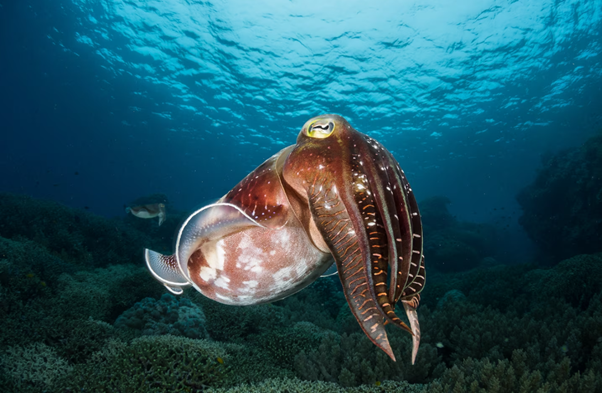
Aliens in Our Oceans
Imagine encountering an otherworldly creature, seemingly from a distant galaxy, right here on Earth. This scenario may not be as far-fetched as it sounds when we consider the incredible cephalopods—cephalopods, such as octopuses and cuttlefish, possess truly unique and fascinating features that often seem straight out of science fiction.
Masters of Disguise
One of the most mesmerizing abilities of cephalopods is their unmatched talent for changing colours and patterns. Octopuses and cuttlefish can rapidly alter their skin texture and colour, enabling them to blend seamlessly into their surroundings or dazzle with vibrant displays. This remarkable camouflage not only aids in evading predators but also in hunting unsuspecting prey.
Cuttlefish, known for their hypnotic beauty, have been observed using their colour-changing abilities in surprising ways. Some species employ hypnotic colour displays to entrance their prey, momentarily freezing them in place before launching an attack—a tactic that seems straight out of a science fiction thriller. These colour changing abilities are not only used for hunting and camouflage but also communication and even tricking potential mates and rivals.

Alien Bodies
Cephalopods possess a unique copper-based blood pigment called hemocyanin, as a result, their blood is blue. This adaptation allows their blood to transport oxygen efficiently in the cold, oxygen-scarce depths of the ocean. Furthermore, their soft bodies lack the rigid internal skeleton typical of most animals, giving them exceptional flexibility and allowing them to squeeze into tight spaces.
Incredible Intelligence
Cephalopods are renowned for their astonishing intelligence, especially considering they lack a backbone. Octopuses, in particular, have demonstrated problem-solving skills, sophisticated hunting strategies, and even the ability to learn by observation—traits traditionally associated with higher vertebrates.
What's more, cephalopods possess a distributed nervous system, with a significant portion of their neurons located in their arms rather than centralized in their brains. This decentralized setup contributes to their incredible dexterity and allows their arms to exhibit complex behaviours even when severed from the body.

Multiple Hearts:
Adding to their uniqueness, cephalopods have three hearts—one systematic heart that pumps blood around the body and two branchial hearts that pump blood to the gills. This arrangement supports their high metabolic rates and active lifestyles, ensuring that oxygen reaches all parts of their bodies efficiently.
Global Distribution:
Cephalopods inhabit diverse marine environments worldwide, from shallow coastal waters to the deepest ocean trenches. They exhibit remarkable adaptability to different ecosystems and have even managed to thrive in regions affected by human activities, making them intriguing subjects of study for marine biologists.
In summary, cephalopods, especially octopuses and cuttlefish, truly embody the concept of "aliens in our oceans" with their extraordinary features and behaviours. Their ability to change colour and texture, coupled with their intelligence, adaptability, and otherworldly anatomy, make them some of the most fascinating and enigmatic creatures on our planet. Studying these marine marvels not only sheds light on the incredible diversity of life in our oceans but also challenges our understanding of what it means to be intelligent and adaptable in the vastness of the underwater world.
Footage of a cuttlefish hypnotising a crab
By Isaac Duke